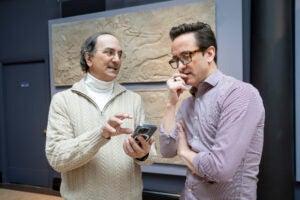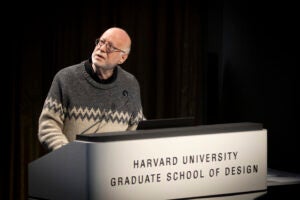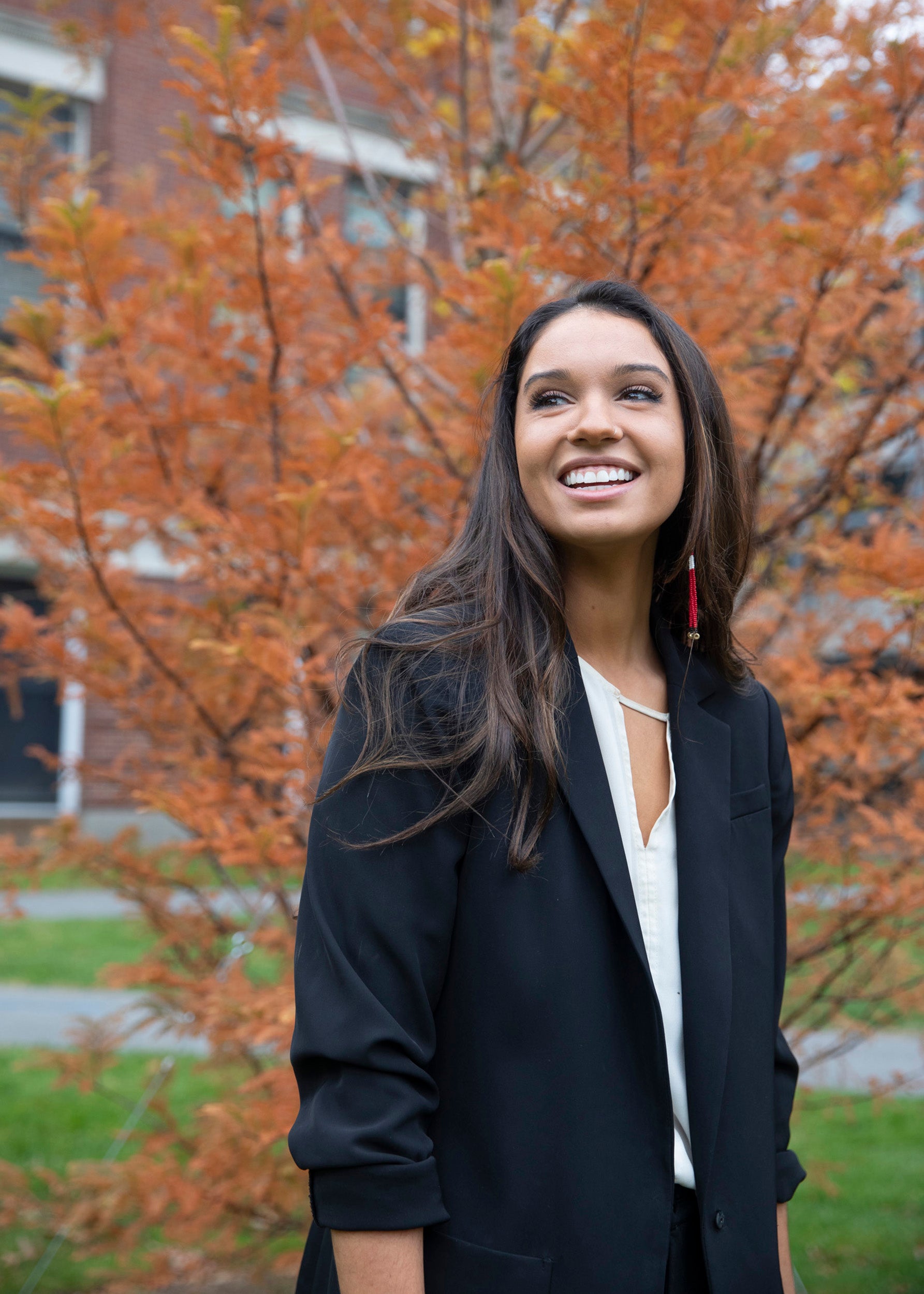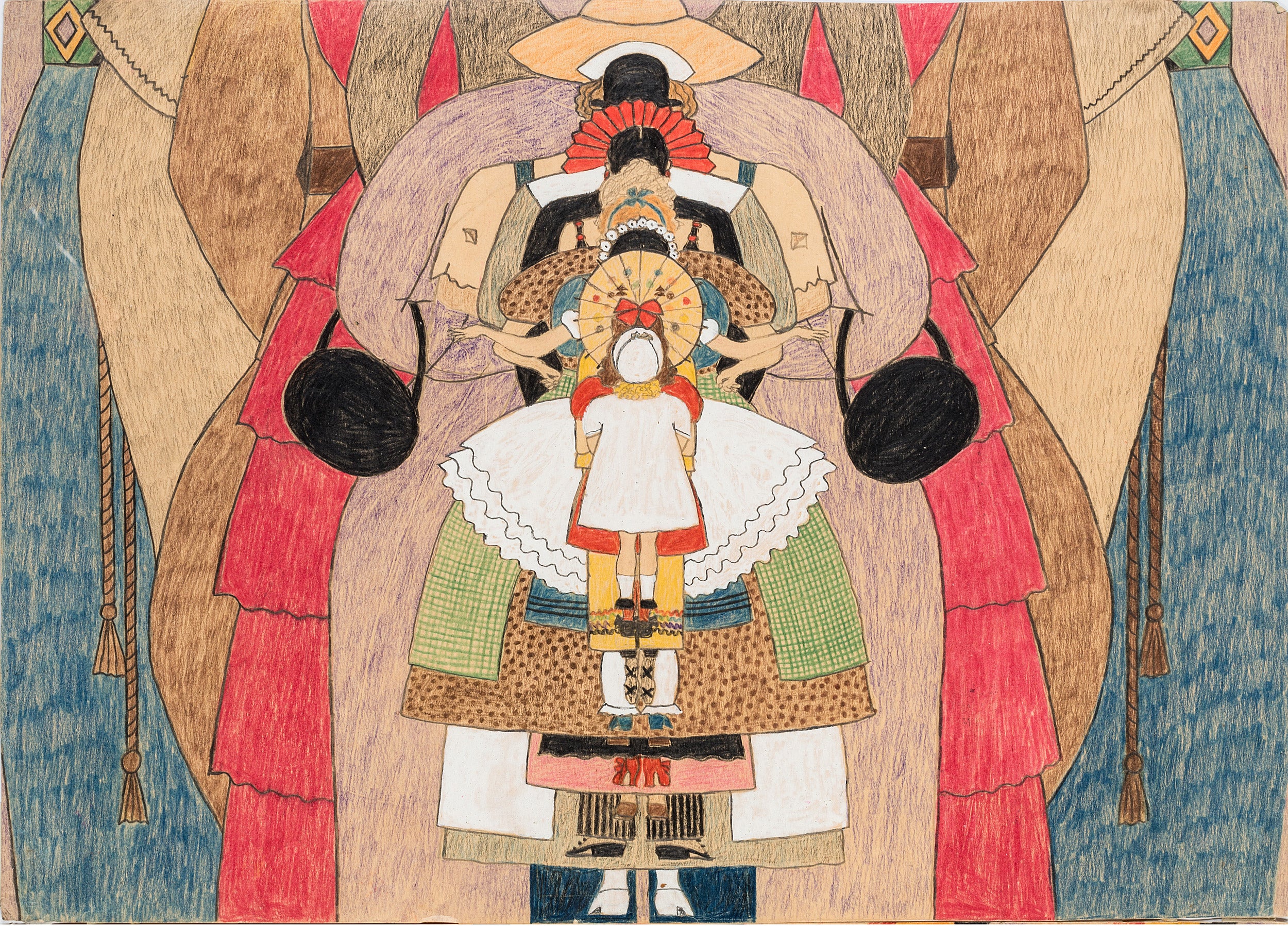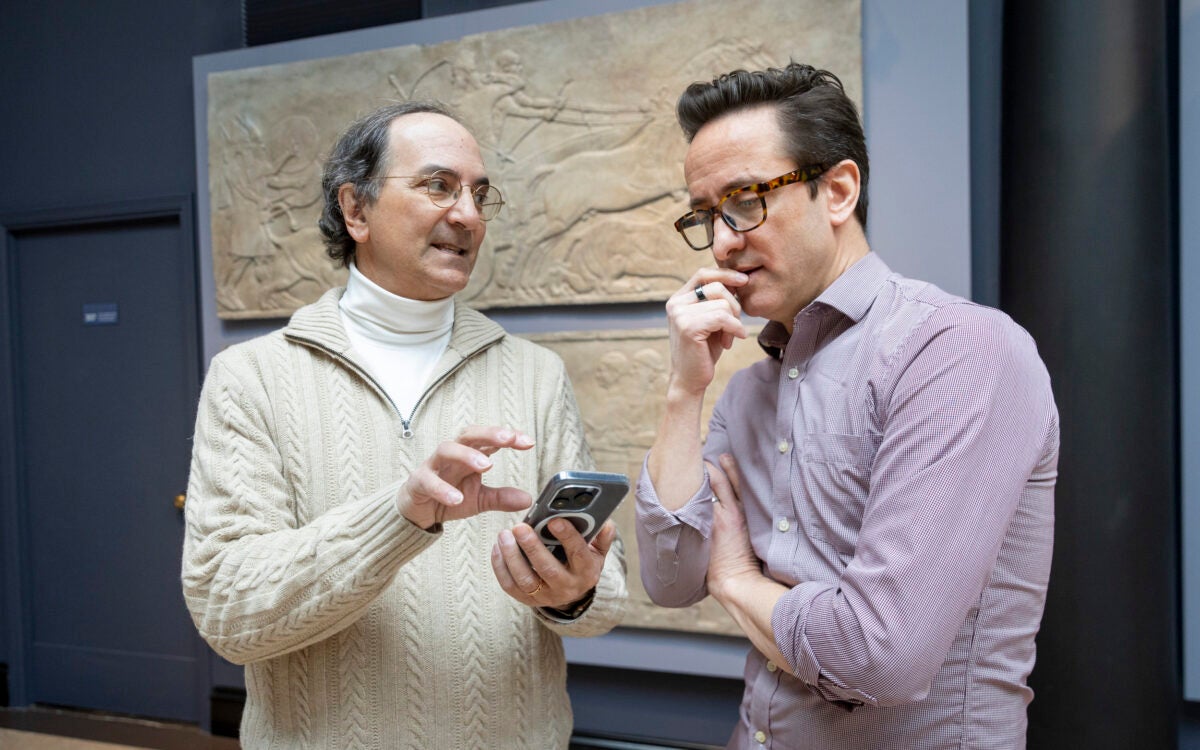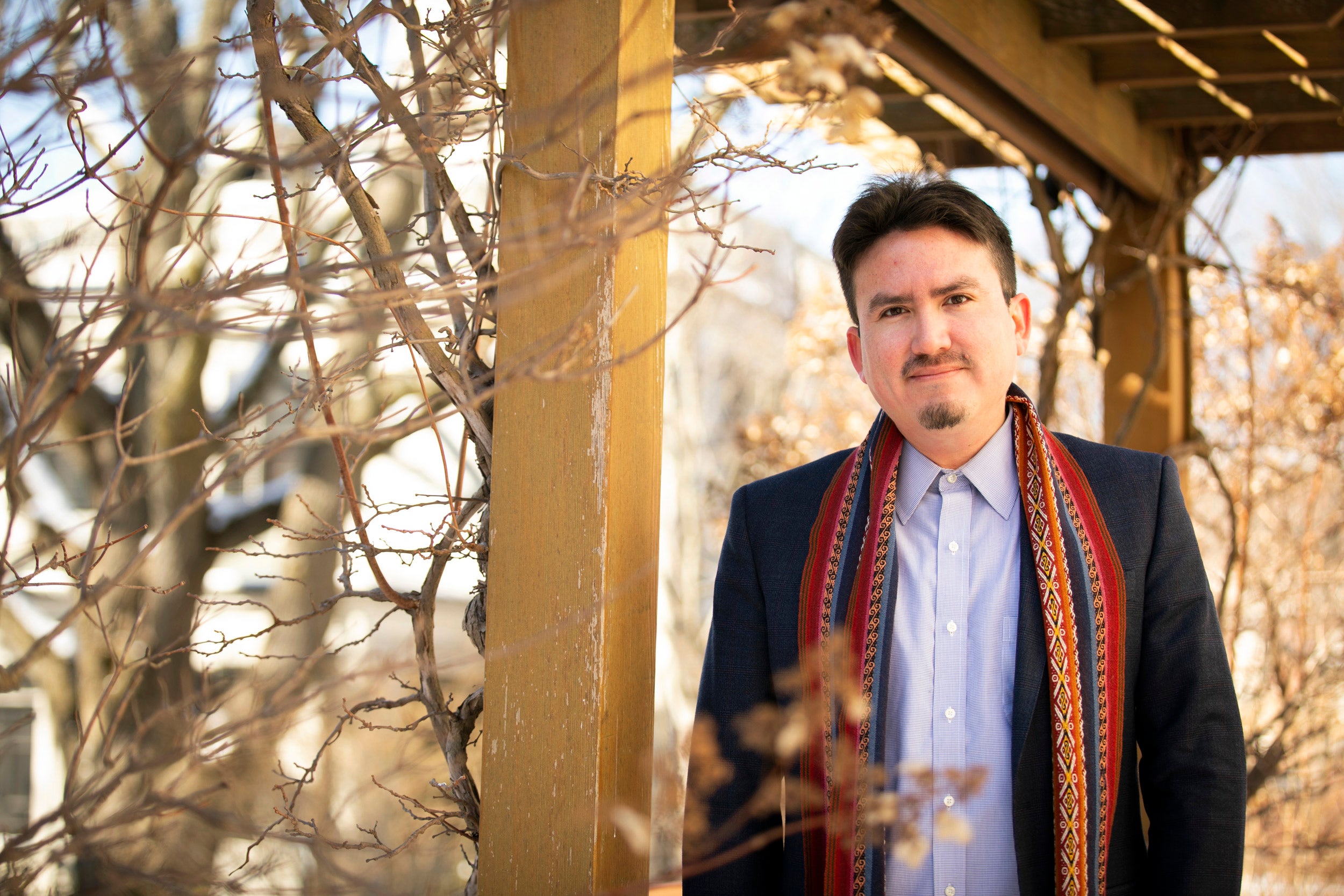
“The same way that it’s ‘normal’ to take a class on other traditions of knowledge, it should be the same to take a class on Indigenous studies or Quechua or Navajo,” says Américo Mendoza-Mori, lecturer in Latinx Studies.
Stephanie Mitchell/Harvard Staff Photographer
Reclaiming Indigenous languages, cultures
Latinx studies scholar says colonial legacies left them devalued, at risk of being forever lost
Across Latin America, millions of people speak Indigenous languages considered endangered by the United Nations. Américo Mendoza-Mori, lecturer in Latinx Studies and faculty director of the Latinx Studies Working Group, is determined to help reclaim them.
Mendoza-Mori’s work in Latin America and with Latinx communities in the U.S. made him aware of how little scholarly work is done on Native languages, which rely heavily on oral tradition. He became specifically interested in Quechua, the former language of the Inca Empire currently spoken by approximately 8 million people throughout the Andes.
“There are community movements of speakers who are not just trying to make sure that the language continues, because it’s an endangered language, but they are also building a whole movement of cultural reclamation,” he explained. This reclamation of language is happening not only in the Andes, but in the wider migrant diasporic communities in the U.S.
Prior to coming to Harvard, Mendoza-Mori launched the Quechua language program at the University of Pennsylvania, with courses focused on the language and Andean culture. He also co-founded The Quechua Alliance, a coalition between the University of California Berkeley, the University of Illinois, and the Quechua program at the University of Pennsylvania. The alliance hosts annual gatherings to promote Quechua and Andean culture throughout the U.S.
Mendoza-Mori reads ‘Kawsaq’ (poem by Irma Alvarez-Ccoscco) in Quechua (with English translation below transcript)
transcript
Transcript:
Kawsaq (poem by Irma Alvarez-Ccoscco)
Wichq’ariypas aychayta,
k’iriypas sunquyta,
qhachuypas ch’ukchayta,
waskhachaypas makiyta chakiyta.
Ichapas,
ichapas mana sayankichu
kurkuy ismunankama.
Chayna kaptinqa,
kuruykunallam apawanqa
Pachamamaykama.
¡Purillasaqtaq chaypipas!
Sach’akunata mikhuchisaq
ismusqa qaraywan.
Arí, ima qhuratapas ruruchisaq,
turaykuna ñañaykuna
mikhunankupaq.
Turankunallataq
ñañaykunallataq
aswan kallpachakunqaku
llanllarisqaywan.
Hinallataq
qhaparisaq
turaypa ñañaypa kunkanpi:
Ari! Quechua kani
Ari! Aymara kani
Ari! Mapuche kani
Awajun!
¡Imatapas ruwaway!
¡Imatapas ruwaway!
Ichaqa, mana hayk’appas
qichuwankichu
pim kasqayta.
Kawsaq (English translation)
Imprison my flesh, if you want,
Harm my heart, if you want,
Tear away my hair, if you want,
Tie my hands and feet, if you want.
Perhaps,
Maybe you do not stop
Until you see my body rot.
If it is going to be like that,
Only my worms will take me to my mother Pachamama.
I will be there too!
I will feed the trees
with my rotting skin.
Yes,
I will grow fruit in any plant
So that my brothers
So that my sisters
Will be fed.
And, then my brothers,
And then my sisters
They will be strengthened
With my rebirth.
And, likewise,
I will scream
In the voices of my brother and sister:
“Yes! I’m Quechua!
Yes! I’m Aymara!
Yes! I’m Mapuche!
Awajun!”
Do what you want!
Do what you want!
But, Never ever
Will you take away
who I am.
Mendoza-Mori hopes that more programs dedicated to languages of Native peoples will bring about additional opportunities for Indigenous scholars and students, while broadening opportunities for exposure for others.
“We understand that maybe not everybody can take a Quechua class or a class on Indigenous studies, but the same way that it’s ‘normal’ to take a class on other traditions of knowledge, it should be the same to take a class on Indigenous studies or Quechua or Navajo,” he said. Mendoza-Mori plans to teach a course in Quechua language next fall, as well as host events and research opportunities through the working group.
“Making these Indigenous studies programs or Indigenous language programs part of the academic infrastructure is a way to also acknowledge that there has been a colonial legacy on the production of knowledge,” he said. “There is a reason why people, including speakers of those languages, might despise or consider that speaking those languages or practicing in traditions” is somehow a lesser activity because they’ve been culturally devalued.
“Acknowledging that colonial legacy, that academic institutions have also been part of producing these hierarchies, is a way to send a message of changing things,” he said.
Mendoza-Mori noted that for the most part, academia has treated Indigenous cultures as a “thing of the past,” instead of focusing on how Native communities “resist, thrive, and [how] they participate in contemporary and even global conversations.” Those communities recently have gotten a lift from social media and other digital technologies, dispelling the myth that Native languages belong to the history books. On TikTok, for instance, Indigenous creators are sharing their languages and cultures to the world through the hashtag #NativeTikTok, which has drawn billions of views.
Indigenous cultures in Latin America
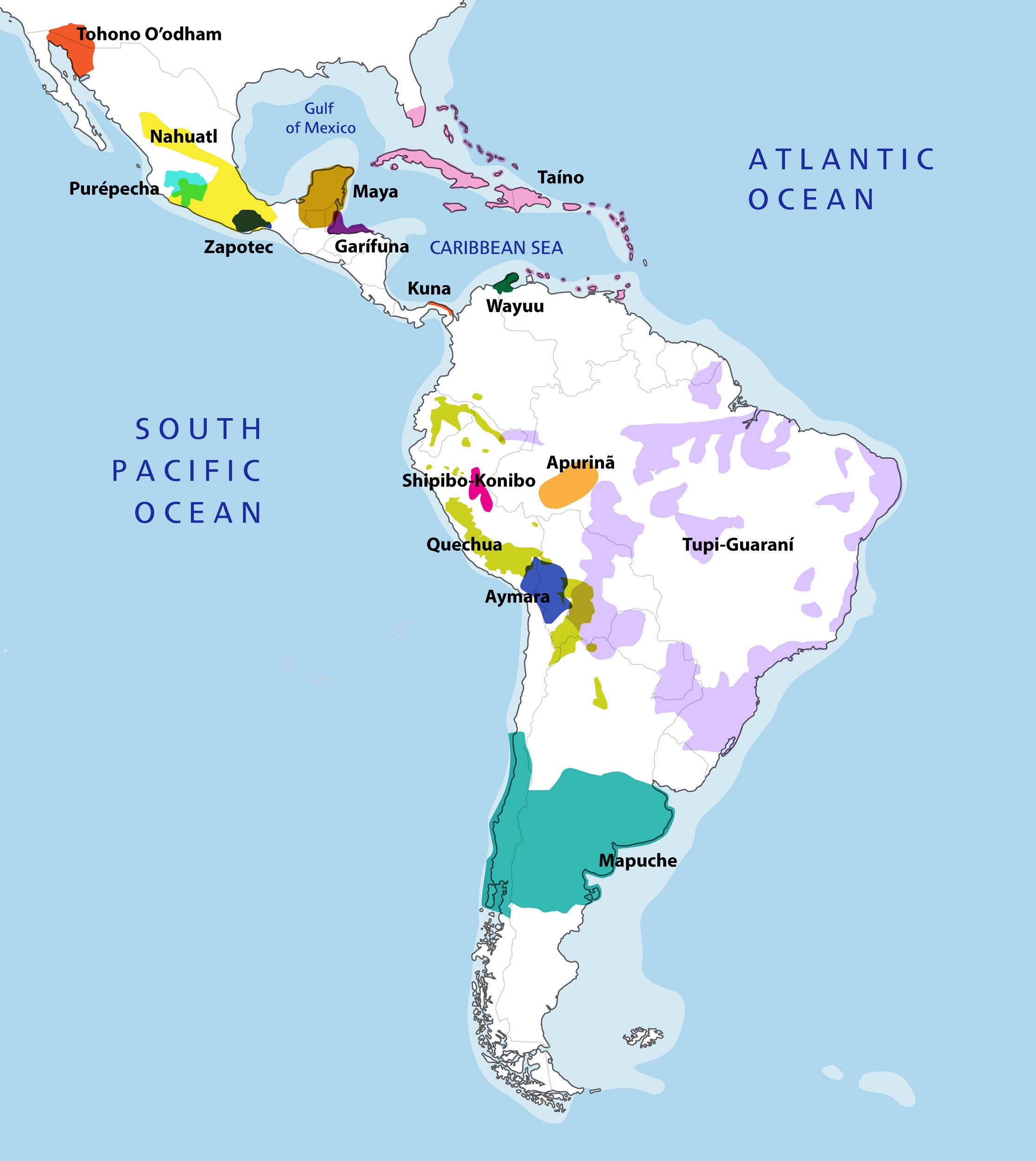
Map shows a sampling of major Native communities in the region.
Map by Judy Blomquist/Harvard Staff; source: Américo Mendoza-Mori
Mendoza-Mori said both academic institutions and international organizations such as the United Nations can play a crucial role in providing these languages and customs a platform. As an example, the Peruvian activist and interdisciplinary scholar pointed to the UN declaring 2019 the year of Indigenous languages, and more recently made 2022 the start of the decade of Native languages. Both designations present chances to raise awareness about these cultures, he said.
Mendoza-Mori is not only interested in Indigenous languages; he also investigates the complex nature of these cultural identities within Latinx communities as well as inequalities experienced by Latinx people in the U.S.
This semester, he is teaching a course on Indigeneity and Latinidad, one of several specialized seminars offered by the Committee on Ethnicity, Migration, Rights to challenge notions of Latinidad, which refers to the shared cultural identity of all Latinx peoples regardless of race, language, or immigration status. The course also aims to shine a light on the diverse communities that live in the U.S.
“In the case of Latin America, and that [also] has been adopted for the Latinx community in the U.S., the notion of mestizaje, or that everybody is mixed, has been prevalent for a while. Just by understanding that the Latin identity was mixed seemed like a subtle issue, when, in reality, it’s more complex,” Mendoza-Mori said. The claim that everyone of Latin heritage is mixed made it “easy” to dismiss Indigenous or Afro heritage in the community, he added.
Ongoing conversations about mestizaje are crucial to understanding Latinidad both for people who identify as Latinx and those that do not. Mendoza-Mori pointed to Central American migrants from Mayan communities who are labeled Latino or Hispanic even though they do not speak Spanish as an example of the complexity of Latinidad.
“Specifically, for the Latinx community, it’s an opportunity to expand the notions of Latinidad,” he said, although those same conversations may also lead some to reject Latinidad.
Mendoza-Mori hopes that by offering a program in Latinx studies, Harvard can engage in contemporary conversations surrounding this kind of diversity. “One approach to fostering diversity could be perceived as a service,” he said. “But another approach to fostering diversity is actually a way to keep up with the conversations and to be at the [fore]front of conversations.”

